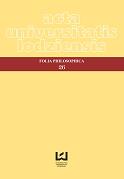Heideggerowski zwrot: jedność bycia i nieantropocentryczna filozofia człowieka
Heidegger’s turn: unity of being and non-anthropocentric philosophy of a human
Author(s): Magdalena Hoły-ŁuczajSubject(s): Philosophy
Published by: Wydawnictwo Uniwersytetu Łódzkiego
Keywords: Heidegger; unity of being; non-anthropocentric philosophy of a human; non-antropocentric;
Summary/Abstract: The article aims to show that one of the most important manifestations of Turn in the philosophy of Martin Heidegger is a change of the ontological status of beings other than human. Transformation of Dasein into Da-sein (which takes place in Heidegger’s works written between year 1930 and 1936) is accompanied by the recognition of being of other beings, “things” (concrete individuals, animate and non-animated). While in Being and Time, other entities are considered “lower” than the man, and unlike him, not “are”, but only “are-handy” or “mere-live”, What is a Thing? (and even already Introduction to the Metaphysics) indicates the unity of being. This does not mean the rejection of the specificity of the human being as Da-sein. Only thanks to human being – not just his own, but also of other beings – is no longer hidden. The specific nature of man according to Heidegger, however, does not entitle him to dominate other beings and treated as a subordinate. Thus I consider late philosophy of Heidegger as non-anthropocentric.
Journal: Acta Universitatis Lodziensis. Folia Philosophica. Ethica - Aesthetica - Practica
- Issue Year: 2013
- Issue No: 26
- Page Range: 95-112
- Page Count: 18
- Language: Polish

